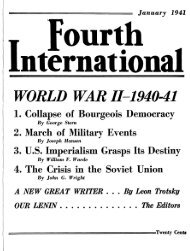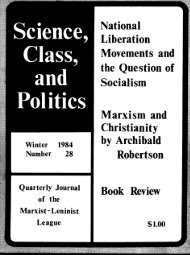Volume 6, No. 2, June, 1918
Volume 6, No. 2, June, 1918
Volume 6, No. 2, June, 1918
Create successful ePaper yourself
Turn your PDF publications into a flip-book with our unique Google optimized e-Paper software.
'<br />
The Internationalist Page seven<br />
The Story of American Socialism<br />
By Lincoln Phifer, Editor "The New World."<br />
THE<br />
I. THE COLONIZING PERIOD<br />
Chapter 6.<br />
THE CAPITALISTIC<br />
COLONY<br />
MERE FACT that the Icarians had lost chiefly<br />
through land swindles calls attention to the further fact<br />
that during the period that marked the drama they<br />
played on the stage of America, capitalist control of industry<br />
for purposes of exploitation had developed strongly in this<br />
country. It gained its first strength chiefly through manipulations<br />
of large bodies of land, until it became a force stronger<br />
than the altruism that wished to use the land for nobler<br />
purposes. The new force began to exercise its influence on<br />
the community proposition in a way which embraces all the<br />
elements of incongruity that make it deliciously humorous.<br />
A capitalistic proposition that turned into a communistic<br />
society and then reverted to the capitalistic form came as<br />
the inverted climax to the drama of the communities.<br />
This variation of the religious colony was brought about<br />
by Joseph <strong>No</strong>yes about 1834. The first point of difference<br />
between it and other colonies lay in the fact that the promotor<br />
was a native of America instead of a foreigner. The<br />
second divergence came through the establishment of manufacture<br />
as the basis of the colony, instead of agriculture, as<br />
with the other colonies. A third line of demarcation lay<br />
in the fact that it began as a joint stock proposition.<br />
The Oneida community was at its inception a family enterprise,<br />
amounting to a partnership. As others expressed<br />
a desire to join the work, and as the writings of Cabot began<br />
to influence the whole people, communistic features were<br />
added. The communistic idea was, therefore, in this case,<br />
an afterthought, while in the other communities it was the<br />
prime concept. The company first and then the community<br />
manufactured steel traps, traveling bags, and silks, and engaged<br />
in the preservation of fruits. Everything they did<br />
was well done, and the community acquired the reputation<br />
of reliability. Yet, up to 1857, the operations of the community<br />
showed a loss of about $40,000. Then, however, a<br />
profit began to develop, and within ten years the community<br />
grew rich. The product for which it attained a national and<br />
last reputation was "community silver," consisting of table<br />
ware.<br />
In doctrines the Oneida community developed characteristic<br />
features. It was among the very first institutions in the<br />
world to pronounce itself favoring total abstinence from intoxicants,<br />
and opposition to chattel slavery. In religious<br />
matters it was no less remarkable. It advocated and permitted<br />
"freedom of love," yet under such conditions that<br />
it was anything but licentious. The three doctrines mentioned,<br />
however, did not meet general approval. Consequently<br />
the colonists came in for severe criticism. Churches<br />
especially denounced them on account of their "freedom of<br />
love in practice and doctrine." It is quite likely that the<br />
charges made in later years against the Marxian Socialists<br />
was an echo of the old fight against this isolated body of<br />
Utopians calling themselves socialists while being in reality<br />
co-operative<br />
capitalists.<br />
After about thirty years, the "Perfectionists," as they called<br />
themselves, abandoned the community, resolving themselves<br />
into a joint stock company.<br />
<strong>No</strong>yes, the founder of the community, possessed high literary<br />
attainments, and was the first historian of American<br />
colonies. The very fact that he was the historian indicates<br />
that the curtain had been run down on the drama. The<br />
unities were completed, and the ending was capitalistic, as<br />
though to call attention to the new force that was in control<br />
of things. The drama of the colonies had been picturesque,<br />
heroic, full of action, combined with the most somber pathos<br />
and delicate humor, and through it all there ran high resolve<br />
and deep philosophy. It had developed a literature of its<br />
own. It had produced a philosophy most beautiful, and advanced<br />
new, great ideas of its own. It had touched the<br />
world.<br />
JOSEPH<br />
ECHOES OF' THE COLONY WAVES<br />
I. MORMONISM<br />
SMITH, founder of Mormonism, was in the<br />
neighborhood of one of the religious colonies, and also<br />
near the home of the Fox Sisters. For six months he<br />
roomed with an avowed socialist. That he was influenced<br />
by these surroundings is plain from his subsequent actions.<br />
Smith began preparation for his work by making a book<br />
that claimed both inspiration and authority. In this he had<br />
a surer ground for building a permanent movement than any<br />
of his predecessors had. When he founded his colony at<br />
Zoar, Ohio, he bound them to him with faith that provoked<br />
enthusiasm, and the church he organized sent missionaries<br />
through all the world. From Ohio his colony moved to<br />
Far West and Independence, Mo. It prospered, but met opposition<br />
from his neighbors. Finally, it was forced to leave<br />
Missouri and took refuge in Illinois. Here it grew, accumulated<br />
wealth and began to exercise a strong political influence,<br />
Smith even announcing himself as a candidate for<br />
president. Probably it was the disturbing element in poli-<br />
tics more than anything else that led to the persecution of<br />
the Mormons in Illinois, culminating in the killing of Smith<br />
and his brother, Hiram.<br />
Brigham Young was chosen the new president of Mormonism,<br />
and, selling the Nauvoo lands to the Icarians, prepared<br />
to seek a home in the distant west. The journey of<br />
the Mormons to Utah is one of the most daring and romantic<br />
things in American history. The taming of the desert by<br />
these spiritualists and co-operators under autocratic control<br />
is a marvel of achievement. And through it all, they sent<br />
missionaries throughout all the world, established new colonies<br />
in other states and even in other nations, and attained<br />
a political power that dominated the west for many decades.<br />
But the practice of polygamy led to a split in the church, and<br />
a new Mormonism was established with headquarters at Independence,<br />
Missouri, near Kansas City. This branch prospered<br />
and grew. Both elements have persisted to the present,<br />
and seem to have a permanence that is predicated, doubtless,<br />
on religious beliefs and practices more than on co-operation.<br />
Yet both freely admit that it was early co-operation that enabled<br />
then to accomplish the remarkable work they did, and<br />
it is a peculiar kind of co-operation that makes good their<br />
boast that there are no pauper Mormons.<br />
o o o<br />
2. OTHER RELIGIOUS COLONIES<br />
The Perfectionist movement had as its central thought the<br />
second coming of Christ. Long after it had its day, Peter<br />
Armstrong, an Adventist preacher, claimed he was inspired
















